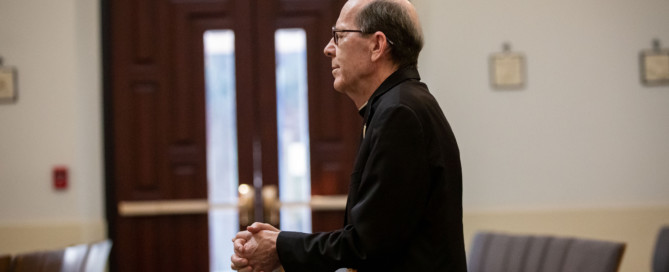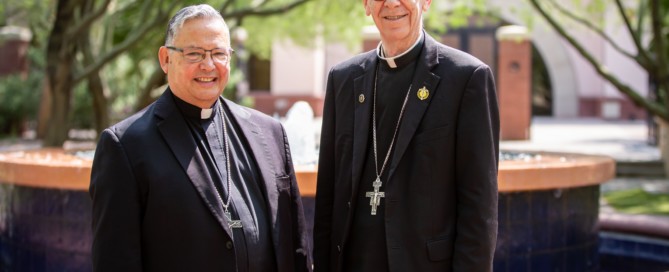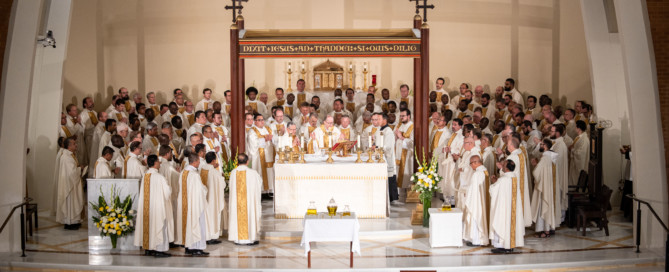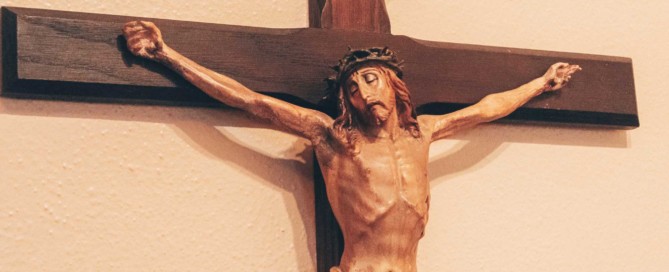Welcome to Our New Website!
Death Penalty Prayer Vigil
Death Penalty Prayer Vigil
Following is the prepared text for Bishop Olmsted’s remarks at the Prayer Vigil for Clarence Dixon and an end to the death penalty in Arizona.
May 10, 2022
As Jesus was dying on the Cross as a condemned criminal, the mother of Jesus was there. Luke describes it this way (Lk 23:33-43),
“They crucified Jesus with two criminals, one on His right and the other on His left…Now one of the criminals …reviled Jesus… The other, however, rebuking him, said in reply, ‘Have you no fear of God, for you are subject to the same condemnation? And indeed, we have been condemned justly, for the sentence we received corresponds to our crimes, but this man has done nothing criminal. Then, he said, ‘Jesus, remember me when you come into your Kingdom.’ He replied to him, ‘Amen, I say to you, today you will be with me in Paradise’.”
Before Jesus’ sacrificial death, Mary heard the prayerful appeal of the repentant criminal, and she heard her beloved Son respond with the promise of eternal life. All this Mary pondered in her heart, pierced by the sorrow of seeing the crucifixion of her innocent Son but also moved by witnessing His Holy Sacrifice which was already redeeming a repentant criminal.
Surely, Mary the Mother of Jesus is with us this evening and is close to the victims and families impacted by horrendous crimes such as the one of which Clarence Dixon was convicted. At the same time, Mary remembers the sincere repentance of the Good Thief and the abundant mercy with which Jesus looked upon him. At every moment of our lives, even in the last hour, the Lord offers us the freedom to be converted and live. For Jesus does not desire the death of the sinner but that he humbly turn back to the Father and be forgiven.
Durante una Misa en St. Louis, Missouri, en enero 1999, el Santo Padre Juan Pablo II dijo: “La nueva evangelización llama a seguidores de Cristo que sean incondicionalmente pro-vida: que anuncien, celebren y sirvan el Evangelio de la vida en cada situacion. Un signo de esperanza es el reconocimiento cada vez mayor de que la dignidad de la vida humana nunca debe ser arrebatada.”
Tristemente, mañana, nuestro estado de Arizona estará llevando a cabo una ejecución. Por eso, estamos reunidos esta noche para orar por las victimas de violencia y sus familias, por el alma de los que se encuentran sentenciados a muerte, y por los lideres cívicos de nuestro estado para que logren abolir la muerte innecesaria a través de la pena de muerte. Dice el Catecismo (#2267), “La pena de muerte es inadmisible, porque atenta contra la inviolabilidad y la dignidad de la persona.”
As Jesus was dying on the Cross, He cried out in anguish to His heavenly Father with the words of Psalm 22, “My God, my God, why have you forsaken me? You are far from my plea and the cry of my distress. O my God, I call by day and you give no reply, I call by night and I find no peace.” Perhaps the same cry of anguish arose from the family of the victim of the man scheduled for execution tomorrow, or from the family of the man sentenced to die. These cries of anguish are not disregarded by those who argue against the use of the death penalty. But we who oppose the death penalty are convinced that even a terrible crime does not remove the human dignity of the criminal. Everyone is created in the image and likeness of God, and for every human person, even the greatest sinner, Jesus suffered and died on the Cross to redeem us from our sins.
When St. Pope John Paul II spoke against the use of the death penalty, he referred to God’s pardon of Cain and the protection that He provided him. Frequently, during his papacy, he called for an end to the death penalty. When, for example, he visited Saint Louis, Missouri, 27 January 1999, he said,
“A sign of hope is the increasing recognition that the dignity of human life must never be taken away, even in the case of someone who has done great evil. Modern Society has the means of protecting itself, without definitively denying criminals the chance to reform. I renew the appeal I made most recently at Christmas for a consensus to end the death penalty, which is both cruel and unnecessary.”
Catholic teaching on the death penalty does not stand in a vacuum. As a mother, the Church has the deepest compassion for those victimized by brutal crimes as well as their families. Accordingly, we need always to pray for the healing of all those affected by these crimes. Use of the death penalty in our nation today is not wrong because it is the equivalent of intrinsically evil killing such as abortion, assisted suicide or euthanasia. These actions involve the taking of innocent human life and are never justifiable in any situation whatsoever. Yet even though the death penalty is not considered intrinsically evil, the Catholic Church remains troubled by its use in contemporary society, and is convinced that it is not needed today. We believe all human life, each human person – from conception to death – is sacred. Recall the Lord’s words (Lev 20: 26), “To me you shall be sacred; for I, the Lord, am sacred.”
But does not the criminal convicted of a horrible crime lose his life’s sanctity? A better way to put the question might be this: is a convicted murderer no longer made in the image of God? Certainly, he ought to be punished in keeping with the gravity of the crime. Certainly, society must be protected against someone proven to be murderous. But even a murderer is not outside of the infinite mercy of God. The possibility for true repentance and salvation remains for every person as long as he is still alive. Furthermore, use of the death penalty, when other means are available to keep society safe, is problematic to the community at large because it actually contributes to a “culture of death.” Such a “solution” uses killing to solve a problem that has other viable solutions.
Pope Francis has repeatedly called for the abolishment of the death penalty. For example, he said (11 October 2017; CCL 2267) : “…the death penalty is inadmissible because it is an attack on the inviolability and dignity of the person.” It contributes to a culture of death. We call for the abolition of the death penalty in every state in America and in every land. Tonight, in particular we pray for Clarence Dixon, that if the execution takes place, he may die with a repentant and contrite heart. In union with Mary, we pray, Lord, have mercy on us all.
Bishop Olmsted and Bishop Nevares Join USCCB in Call to Prayer
Bishop Olmsted and Bishop Nevares Join USCCB in Call to Prayer
May 4, 2022
Bishop Thomas J. Olmsted and Bishop Eduardo A. Nevares of the Roman Catholic Diocese of Phoenix join Archbishop William E. Lori and the USCCB in urging the faithful to pray for life and the Supreme Court.
WASHINGTON – In response to the leak of a draft opinion in the Supreme Court case of Dobbs v. Jackson Women’s Health Organization, Archbishop William E. Lori of Baltimore, chairman of the U.S. Conference of Catholic Bishops’ (USCCB) Committee on Pro-Life Activities issued the following call to prayer:
“The leak related to the U.S. Supreme Court case of Dobbs v. Jackson Women’s Health Organization reminds us of the urgent need for prayer and action at this pivotal moment in our country.
“As Catholics, we care about every unborn child and every mother. Our Church has consistently witnessed in word and deed that life begins at the moment of conception. As the bishops shared in our statement Standing with Moms in Need: we pledge ‘to redouble our efforts to accompany women and couples who are facing unexpected or difficult pregnancies, and during the early years of parenthood, offering them loving and compassionate care through initiatives such as Walking with Moms in Need and countless others.’
“At the same time, as we await the Court’s decision, we urge everyone to intensify their prayer and fasting that the final decision of the Court will bring about the reversal of Roe and Casey.
“We hope and pray for a change in our laws and stand ready to help all pregnant women in need in each of our communities.
“Our Lady of Guadalupe, pray for us and guide us.”
The USCCB is an assembly of the hierarchy of bishops who jointly exercise pastoral functions on behalf of the Christian faithful of the United States and the U.S. Virgin Islands. Learn more about the USCCB Committee on Pro-Life Activities at usccb.org/prolife.
The Diocese of Phoenix, Arizona comprises 43,967 square miles. It has a total population of 4,734,036 people of which 1,188,243 or 25 percent, are Catholic.
Bishops of the Arizona Catholic Conference Statement Opposing the Resumption of Executions in Arizona
Bishops of the Arizona Catholic Conference Statement Opposing the Resumption of Executions in Arizona
Regional prayer events listed below
May 3, 2022

For the first time since 2014, Arizona is currently preparing to resume executions in the very near future. Unfortunately, once these executions begin it is likely many more will come in relatively quick succession.
The Bishops of the Arizona Catholic Conference (ACC) remain steadfast in our continued opposition to the death penalty, especially in this modern era. In doing so, we are united with Pope Francis who has advocated for a global end to capital punishment.
In discussing capital punishment, however, it is first critical to never forget the horrible crimes committed and the terrible loss experienced by the families of victims. Our concern is for all who are victims of such heinous crimes, and we support the provision of compassionate and professional assistance to the families and loved ones of victims. We fervently pray for their healing and that their needs are never forgotten!
As bishops, our primary opposition to the death penalty is rooted in the teaching of the Catholic Church that every person is created in the image and likeness of God. For this reason, we are compelled to uphold the sacred dignity of all human life.
We are also mindful of the many problems associated with the death penalty that are in conflict with the concepts of human dignity and equal application of the law. Specifically, across the nation, including in Arizona, the use of the death penalty is troublesome because it is often influenced by factors such as geography and is disproportionately imposed on people of color and of limited economic means.
Furthermore, the risk of executing an innocent person is not illusory. More than 180 people in the United States have been wrongfully convicted and sentenced to death only to be later exonerated. In Arizona alone, ten people have been released from death row after evidence was later found to exonerate them.
The execution of prisoners can also be problematic in that it may deny them a final chance at redemption and salvation. As Catholics we believe that all of us, including even the worst sinner, has a chance at forgiveness and to reconcile themselves with God as long as they live. While some inmates on death row do seek forgiveness, the execution of others permanently closes this door.
We are fortunately living in a time where modern prisons create an environment that does not require the death penalty to keep us safe. Our society is able to achieve justice and protect its population from harm.
Accordingly, the resumption of capital punishment in Arizona is an extremely expensive proposition that is fraught with many of the problems discussed. It furthers a culture of death that is all too common in our society and is something that we are called to reject.
As the Bishops of the Arizona Catholic Conference, we, therefore, encourage all people of goodwill to join us in praying and advocating for an end to the death penalty and for the soul of Clarence Dixon as his scheduled execution date approaches.
EVENTS
May 4, 6 p.m., Our Lady’s Chapel at St. Augustine Cathedral, 192 S Stone Ave, Tucson
Bishop Edward Weisenburger will lead a holy hour of adoration (more information).
May 6, 11 a.m., virtual event
Bishop Weisenburger will lead a national prayer vigil with the Catholic Mobilizing Network (more information).
May 7, 8:30 a.m., Sacred Heart Cathedral, 415 E Green Ave, Gallup
Bishop James Wall will lead a rosary.
May 10, 6:30 p.m., Ss. Simon and Jude Cathedral, 6351 N 27th Ave, Phoenix
Bishop Olmsted and the Sisters of Life will lead a one-hour prayer vigil.
Most Rev. Edward J. Weisenburger
Bishop of Tucson
Most Rev. Thomas J. Olmsted
Bishop of Phoenix
Most Rev. James S. Wall
Bishop of Gallup
Most Rev. Eduardo A. Nevares
Auxiliary Bishop of Phoenix
Declaración de los Obispos de la Conferencia Católica de Arizona sobre la Oposición a la reanudación de las Ejecuciones por Pena de Muerte en Arizona
Eventos de oración regionales enumerados a continuación
3 de mayo 2022
Por primera vez desde 2014, Arizona se está preparando para reanudar las ejecuciones por Pena de Muerte en un futuro muy cercano. Desafortunadamente, una vez que comiencen estas ejecuciones, es muy probable que lleguen muchas más en una sucesión relativamente rápida.
Los obispos de la Conferencia Católica de Arizona (ACC) nos mantenemos firmes en nuestra contínua oposición a la pena de muerte, especialmente en esta era moderna. Al hacerlo, nos unimos al Papa Francisco, quien ha abogado por el fin de la pena capital en el mundo.
Sin embargo, al hablar de la pena capital, en primer lugar es fundamental que no nos olvidemos nunca de los horribles crímenes cometidos y la terrible pérdida experimentada por las familias de las víctimas. Nuestra preocupación es por todos los que son víctimas de crímenes tan atroces, y apoyamos la provisión de atención compasiva y profesional de asistencia a las familias y a los seres queridos de las víctimas. ¡Oramos fervientemente por su sanación y que nunca nos olvidemos de sus necesidades!
Como obispos, nuestra principal oposición a la pena de muerte tiene sus raíces en las enseñanzas de la Iglesia Católica de que toda persona ha sido creada a imágen y semejanza de Dios. Por esta razón, nos vemos obligados a defender la sagrada dignidad de toda vida humana.
También somos conscientes de los muchos problemas asociados con la pena de muerte que están en conflicto con los conceptos de la dignidad humana y la aplicación igualitaria de la ley. Específicamente, en todo el país, incluido el estado de Arizona, el uso de la pena de muerte es problemático porque a menudo está influenciado por factores geográficos y se impone desproporcionadamente a las personas de grupos minoritarios y de escasos recursos económicos.
Además, el riesgo de ejecutar a una persona inocente no es algo fuera de lo común . Más de 180 personas en los Estados Unidos han sido injustamente condenadas y sentenciadas a muerte y mas tarde fueron exoneradas porque fue probada su inocencia. Solo en el estado de Arizona, diez personas han sido liberadas del corredor de la muerte después de que se encontraron pruebas de su inocencia.
La ejecución de presos también puede ser problemática porque puede negarles una última oportunidad de redención y salvación. Como católicos, creemos que todos nosotros, incluso el peor pecador, tenemos una oportunidad para pedir perdón y para reconciliarnos con Dios mientras vivimos. Mientras algunos reclusos en el corredor de la muerte sí buscan el perdón, la ejecución de otros les cierra esta puerta permanentemente.
Afortunadamente, vivimos en una época en la que las prisiones modernas crean un entorno que no require de la pena de muerte para mantenernos a salvo. Nuestra sociedad es capaz de hacer justicia y de proteger a su población de ser dañada.
En consecuencia, la reanudación de la pena capital en Arizona es una propuesta extremadamente costosa que está plagada de muchos de los problemas mencionados anteriormente. Fomenta una cultura de la muerte que es demasiado común en nuestra sociedad y es algo que estamos llamados a rechazar.
Como obispos de la Conferencia Católica de Arizona, animamos a todas las personas de buena voluntad a unirse a nosotros para orar y abogar por el fin de la pena de muerte y por el alma de Clarence Dixon ya que se acerca la fecha prevista para su ejecución.
EVENTOS
4 de mayo, 6 p.m., La Capilla de Nuestra Señora en la Catedral de San Agustin, 192 S. Stone Ave, Tucson
El Obispo Edward Weisenburger dirigirá una hora santa de adoración.
6 de mayo, 11 a.m., evento virtual
El Obispo Weisenburger dirigirá una vigilia de oración nacional con Catholic Mobilizing Network.
7 de mayo, 8:30 a.m., La Catedral del Sagrado Corazón, 415 E Green Ave, Gallup
El Obispo James Wall dirigiá un rosario.
10 de mayo, 6:30 p.m., Catedral de los Ss. Simon y Judas, 6351 N 27th Ave, Phoenix
El Obispo Olmsted y las Hermanas de la Vida dirigirán una vigilia de oración durando una hora.
Reverendísimo Edward J. Weisenburger
Obispo de Tucson
Reverendísimo Thomas J. Olmsted
Obispo de Phoenix
Reverendísimo Eduardo A. Nevares
Obispo Auxiliar de Phoenix
Reverendísimo James S. Wall
Obispo de Gallup
Bishops of the Arizona Catholic Conference Statement On Governor Ducey Signing Bill to Improve Religious Accommodations for Dying Patients
Bishops of the Arizona Catholic Conference Statement On Governor Ducey Signing Bill to Improve Religious Accommodations for Dying Patients
 April 25, 2022
April 25, 2022
The Bishops of the Arizona Catholic Conference (ACC) are grateful that Governor Doug Ducey has signed into law legislation (HB 2449) to better provide religious accommodations for dying and sick patients.
HB 2449 is similar to a beneficial law passed last year pertaining to hospital patients and extends these accommodations to other places where people die such as care facilities and hospice.
We remain extremely grateful for the dedicated health care providers who have done so much to assist people in need over the course of the pandemic. After all, patients typically need both great care for their bodies as well as for their souls.
Being able to have clergy present at the end of life is important to people of many different faiths. Their presence is not only important to the patient, but it also brings tremendous peace of mind to the surviving relatives.
Accordingly, the ACC appreciates Representative Quang Nguyen for sponsoring HB 2449 and all the elected official of both parties who supported this legislation.
Most Rev. Edward J. Weisenburger
Bishop of Tucson
Most Rev. Thomas J. Olmsted
Bishop of Phoenix
Most Rev. James S. Wall
Bishop of Gallup
Most Rev. Eduardo A. Nevares
Auxiliary Bishop of Phoenix
Declaración de los Obispos de la Conferencia Católica de Arizona Acerca de la firma del Gobernador Ducey para aprobar el Proyecto de Ley para Proveer Acomodaciones Religiosas a los Pacientes en etapa terminal.
25 de abril de 2022
Los Obispos de la Conferencia Católica de Arizona (ACC) están agradecidos con el Gobernador Doug Ducey por firmar y convertir en ley el Proyecto (HB 2449) para proveer de mejor manera las acomodaciones religiosas para los pacientes enfermos y en etapa terminal.
HB 2449 es similar a una ley que se aprobó el año pasado, y que benefició a los pacientes de los hospitales, y extiende estas acomodaciones a otros lugares donde la gente llega para morir tales como los centros de cuidado y los hospicios.
Estamos sumamente agradecidos por la dedicación de los proveedores de cuidado de la salud que han hecho tanto para asistir a la gente en necesidad durante el curso de la pandemia. Despues de todo los pacientes siempre requieren un gran cuidado, tanto para su cuerpo, como para su alma.
El poder tener a miembros del clero presentes al final de la vida es muy importante para la gente de diversos credos religiosos. Su presencia es importante para el paciente y también trae una tremenda paz para los familiares de la persona agonizante.
Respectivamente, la ACC extiende su agradecimiento al Representante Quang Nguyen que patrocinó el Proyecto de Ley HB 2449 y a los oficiales elegidos de ambos partidos que apoyaron esta legislación.
Reverendísimo Edward J. Weisenburger
Obispo de Tucson
Reverendísimo Thomas J. Olmsted
Obispo de Phoenix
Reverendísimo Eduardo A. Nevares
Obispo Auxiliar de Phoenix
Reverendísimo James S. Wall
Obispo de Gallup
Priest as a Man of Communion
Priest as a Man of Communion
Following is the prepared text for Bishop Olmsted’s homily for the Annual Chrism Mass.
April 11, 2022
“The joy and hope, the grief and anguish of the people of our time, especially of those who are poor or afflicted in any way, are the joy and hope, the grief and anguish of the followers of Christ as well. Nothing that is genuinely human fails to find an echo in their hearts.”
These first words of the Second Vatican Council’s Pastoral Constitution Gaudium et Spes describe well the hearts of faithful disciples of Jesus. After some years of the COVID Pandemic and in the shadow of a horrific war of aggression in Ukraine, may it be said of us that “nothing that is genuinely human fails to find an echo in their hearts.”
My brothers and sisters in Christ, it is good for us – clergy, Religious, and laity – to be united in prayer at this Chrism Mass. In particular, it is good for us priests and bishops to praise God for His unfailing mercy as we recall the day when we were ordained to serve Him in as priests. In the wake of the tumultuous times in which we live, times that could discourage and divide us, our people have a right and a need to hear from us priests and bishops a public renewal of the commitment each one made to Jesus on the day of Ordination. The Church asks us priests to renew our priestly promises every year at the Chrism Mass. So, dear brother priests, let us do so with even greater resolve to grow in our love of Christ and faithful service of God’s people.
Doy gracias a Dios por cada uno de ustedes, mis hermanos sacerdotes de la Diócesis de Phoenix, hombres de fe viva y siervos generosos de Cristo. Como nosotros sabemos muy bien, la habilidad para ser siervos de la misericordia de Dios esta’ basada en la llamada de Jesus y la gracia de ordenación sacerdotal. No esta’ basada en que seamos mejores que otros miembros de la Iglesia. Por la gracia de Dios, somos lo que somos. Jesucristo escoge el débil, no el fuerte; al mismo tiempo, nos da la gracia para ser siervos fieles de su Reino.
When all the priests of the diocese renew their commitment to priestly service, together as a body gathered in Jesus’ holy Name, they constitute a symbol of the decisive role that priestly fraternity plays in the life of every priest. You and I truly are our brother’s keeper. In this regard, I give thanks to God for Bishop Nevares, his fraternal love, and his delightful way of serving the Lord with gladness.
There is great wisdom in Jesus’ plan to send His Apostles out two by two. When we love one another, when we support and encourage each other, when we live priestly fraternity, the light of Christ shines forth; and individualism is overcome. We help one another to make a total gift of self to the Lord, following the example of Jesus on the Cross. The fraternity created by the sacramental grace of Holy Orders provides fertile ground for ongoing growth in holiness. Recall the words of St. Peter in his Second Letter (1:10f), “…brothers, be all the more eager to make your call and election firm, for, in doing so, you will never stumble. For, in this way, entry into the eternal Kingdom of our Lord and Savior Jesus Christ will be richly provided for you.”
It is instructive to recall how Jesus, not long after He initiated His Public Ministry, began to withdraw from the crowds and to call the Apostles aside in order to spend more time with them, explaining to them the meaning of the parables, correcting their false understandings, rebuking them for their selfish ambitions, and inviting them to become ever more closely united with Him and one another. Priestly fraternity, we can see, is not just a sociological concept; it is a sacramental reality intended by Jesus from the beginning. A priest learns to be a man of communion by living in a communion of truth and love with Jesus and with his brother priests. This is both gift and responsibility, something we do not deserve, but something to be protected and deepened with the help of God’s grace.
In a world that languishes under the anguish of isolation and division, fraternal bonds that priests enjoy with one another become an ever more precious gift and a light that shines ever more brightly in the darkness of unbelief, beckoning to faith those who have not yet accepted this great gift.
In the Synagogue in Nazareth, Jesus “unrolled the scroll of the Prophet Isaiah” and “found the passage where it is written: ‘The Spirit of the Lord is upon me, because He has anointed me to bring glad tidings to the poor’.” Then, Jesus added: “Today this Scripture passage is fulfilled in your hearing.” Is this not what we seek in our parish communities? The living Jesus Christ never ceases to bring glad tidings to the poor. These Scriptures also are fulfilled when any priest, no matter how seemingly ordinary his life and ministry, lives as a man of communion.
As we call down God’s blessing on all His people today, we pray with filial respect for Pope Francis and with fraternal love for our brother priests. In this Mass, too, let us pray for our seminarians and for an increase in vocations to the priesthood, that the Lord will raise up many more priests to bear witness to His Kingdom. May the words of Gaudium et Spes be proven true among us who are disciples of Jesus today: “Nothing that is genuinely human fails to find an echo in their hearts.”
Words of Love from the Cross
Words of Love from the Cross
Following is the prepared text from Bishop Olmsted’s homily on Palm Sunday.
April 10, 2022
When Jesus suffered death on the Cross, the dreams and hopes of Jesus’ Apostles were shattered. His followers went away, beating their breasts in sorrow and despair. However, a faithful few saw something happening that the others failed to see, namely the love of God conquering hatred and despair. These faithful few were – Mary, His mother, – Mary Magdalene, – Simon of Cyrene who helped Jesus carry His Cross, and – one of the criminals who was crucified beside Him. All these found God’s love in a place they least expected, at a time that seemed disastrous, in a way others thought impossible. During the Passion, three statements reveal Jesus’ love at work in suffering.
First, Jesus said, “Father, forgive them; they know not what they do.” Jesus prayed for those who were putting Him to death; He even provided them an excuse. Our Savior reminds us that God finds no pleasure in the death of the wicked but rather that they be converted and live. As He taught in the parables (Lk 15:7): “there will be more joy in heaven over one sinner who repents than over 99 righteous people who have no need to repent.”
The second statement that reveals Jesus’ love in the face of suffering happened when the criminal crucified alongside Him said, “Remember me when you come into your Kingdom.” At once, Jesus replied, “I assure you, this day you will be with me in paradise.” At the most painful time in this criminal’s life, at a moment of intense agony and shame, he discovered that His Savior was right beside Him, suffering with Him — even though He was innocent, suffering out of love for His heavenly Father and out of love for every person. Here a dying criminal found the promise of everlasting life. That is the mystery of love we find at the Cross.
Third, the final words that express Jesus’ love from the Cross are these, “Father…into your hands I commend my spirit.” This was not the first time Jesus had spoken these words. All His life He had prayed them. This is the first prayer that Jesus learned from His mother, the prayer that He said every night, the words that, still today, Jewish parents teach their children to pray before falling asleep: Psalm 31, verse five.
Even as Jesus was dying on the Cross, He prayed with the love and trust of a child: “Father, into your hands, I commend my spirit.” He also says, “Unless you change and become like children, you cannot enter the Kingdom of God.” Jesus’ death on the Cross is His greatest act of love. “Greater love than this no one has, to lay down his love for his friends.” These things Jesus said from the Cross reveal His power to transform suffering into peace, to absolve sin through forgiveness. Whenever we sin and stand in need of God’s mercy, let us recall Jesus’ words, “Father, forgive them…”
Every night, before we fall asleep, let us say, “Father, into your hands I commend my spirit.”
At the time of our death, may we hear Jesus say to us, “This day you will be with me in paradise.”
Bishops of the Arizona Catholic Conference Statement on Governor Ducey Signing Bill to Ban Abortions at 15-Weeks Gestation into Law
Bishops of the Arizona Catholic Conference Statement on Governor Ducey Signing Bill to Ban Abortions at 15-Weeks Gestation into Law
March 30, 2022
 The Bishops of the Arizona Catholic Conference (ACC) are grateful that Governor Doug Ducey has signed into law legislation (SB 1164) that is designed to further protect women and their unborn children.
The Bishops of the Arizona Catholic Conference (ACC) are grateful that Governor Doug Ducey has signed into law legislation (SB 1164) that is designed to further protect women and their unborn children.
Depending upon the outcome of litigation currently before the U.S. Supreme Court, there is a very good chance that Arizona will have the opportunity to also protect life at 15-weeks gestation.
Protecting life at this stage of development is important. Well before 15 weeks, the preborn baby already takes on “human form” in all relevant aspects. In fact, by 12 weeks of gestational age she can already open and close fingers, make sucking motions, and sense stimulation from outside the womb. Perhaps because of these reasons, the 15-week ban in SB 1164 is much more in line with the rest of the world in terms of abortion laws.
Finally, it is recognized by the abortion industry that women seeking abortions do so because of stressful circumstances, financial pressure, and relationship discord. This is a tragedy, and it is the reason why we continue to advocate for solutions to these problems other than the taking of an innocent life through abortion.
For these reasons, the ACC appreciates Senator Nancy Barto for sponsoring SB 1164 and Governor Doug Ducey for signing it into law!
Most Rev. Edward J. Weisenburger
Bishop of Tucson
Most Rev. Thomas J. Olmsted
Bishop of Phoenix
Most Rev. James S. Wall
Bishop of Gallup
Most Rev. Eduardo A. Nevares
Auxiliary Bishop of Phoenix
Declaración de los Obispos de la Conferencia Católica de Arizona sobre la aprobación del proyecto de ley por el Gobernador Ducey para prohibir los abortos a las 15 semanas de gestación
30 de marzo de 2022
Los obispos de la Conferencia Católica de Arizona (ACC) agradecen que el gobernador Doug Ducey ha convertido en ley el Proyecto (SB 1164) que está diseñado para proteger aún más a las mujeres y sus bebés por nacer.
Dependiendo del resultado de la demanda legal que se está llevando actualmente ante la Corte Suprema de los Estados Unidos, existen muy buenas posibilidades de que Arizona tenga la oportunidad de proteger también la vida a las 15 semanas de gestación.
Proteger la vida en esta etapa del desarrollo es muy importante. Mucho antes de las 15 semanas, el bebé en el vientre materno ya tiene “forma humana” en todos los aspectos relevantes. De hecho, a las 12 semanas de gestación la bebé ya puede abrir y cerrar sus manitas, se chupa el dedo, y es capaz de percibir sensaciones de estimulos que provienen fuera del utero. Quizás por estas razones, la prohibición de 15 semanas en el Proyecto de Ley SB 1164 está mucho más en línea con el resto del mundo en términos de leyes sobre el aborto.
Finalmente, la industria del aborto reconoce que las mujeres que buscan abortar lo hacen debido a circunstancias estresantes, presión financiera y discordia en las relaciones. Esto es una tragedia, y es una de las razones por las que continuámos abogando por soluciones a estos problemas que no incluyan el acabar con una vida inocente a través del aborto.
Por estas razones, la Conferencia Católica de Arizona (ACC) le agradece a la Senadora Nancy Barto por patrocinar el Proyecto de Ley SB 1164 y al Gobernador Doug Ducey por convertirlo en ley.
Reverendísimo Edward J. Weisenburger
Obispo de Tucson
Reverendísimo Thomas J. Olmsted
Obispo de Phoenix
Reverendísimo Eduardo A. Nevares
Obispo Auxiliar de Phoenix
Reverendísimo James S. Wall
Obispo de Gallup





